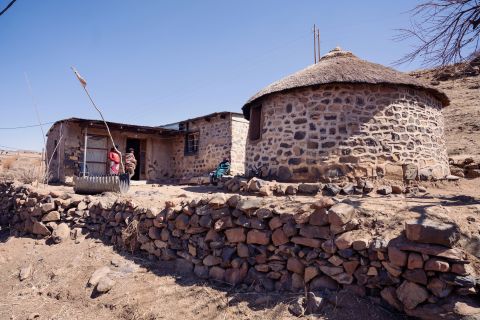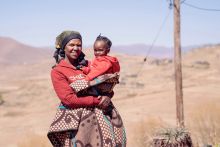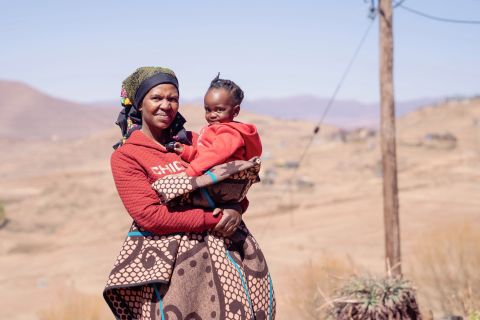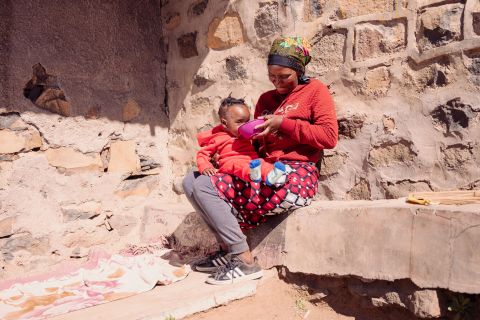Basic
The first five years are crucial to lay the foundation for future health. In remote regions of Lesotho, many children are not given this opportunity to thrive. One such child is Siyabonga. He is now receiving support as part of a new SolidarMed project.
Content
Content Text
6.2 kilos: this is how much Siyabonga weighed when he was 18 months old. An average healthy toddler should weigh 11.5 kilos at this age. The circumference of his upper arm was only ten centimetres, although it should be at least three centimetres more. His delayed development was due to malnourishment caused by food insecurity and poverty. This delayed development can have far-reaching and lifelong consequences. Because the first 1,000 days of early childhood development are crucial, and it is often impossible to catch up on the missed growth.
Siyabonga’s family live in Mapholaneng in the Mokhotlong District in northeastern Lesotho at over 2,000 metres altitude. The barren landscape surrounding the family home is unfertile and they have to travel long distances to fetch drinking water. The village is so remote that people have to travel many kilometres on foot or horseback to reach the nearest healthcare facility. People here have to contend with several difficulties. The unemployment rate in the small country of around 2 million inhabitants is 25%. Self-sufficiency is not an alternative for most people as only 12% of land can be farmed – that’s three times less than in Switzerland.
Loving care is crucial
Public health is also a challenge. According to official statistics, 2,500 children suffer from the consequences of malnutrition every year, 500 of whom are severely malnourished. One in three children has delayed growth. The region also faces high mortality in under-fives, with one in every nine children dying before they reach their fifth birthday. Food scarcity in Lesotho is not conducive to the health of infants and toddlers either. The number of children under five suffering from anaemia and stunting is soaring. On top of that, 40% of infants under six months are no longer breastfed for various reasons, and only one in ten children eats enough to support healthy growth.
Childcare – which is key to development – is often hard to organise, as for example a quarter of adults are living with HIV – the second-highest HIV prevalence rate in the world. The disease often affects the economically productive age group, which means many children are orphaned. Of the 100,000 HIV orphans in Lesotho, 18,000 live in the mountains.
Content Media

Content Text
Siyabonga is not an orphan. His mother Nolast is 39. She has five children with Siyabonga’s father but the family doesn’t live together. The eldest daughter is already married and lives with her husband. The two teenaged sons live with Nolast’s sister where they attend school. Only Boniswa and little Siyabonga live with Nolast in the modest family hut. Nolast also lost another four children. “The children’s father doesn’t live with us. He works in South Africa, where he looks after farmers‘ cattle,” explains Nolast.
But he doesn’t earn enough to feed the family. “I sold home-brewed beer to earn a bit extra. But even that wasn’t enough,” says Nolast, who therefore left her children with her sister to take a job in South Africa. Many parents in this region have to leave their children with relatives or older siblings to be able to go and work in neighbouring South Africa. This often results in the children not receiving sufficient pre-school support and care.
Content Text
Frühkindliche Entwicklung in Lesotho
Am Donnerstag, 5. Dezember, können Sie ab 17 Uhr am Webinar «Frühkindliche Entwicklung in Lesotho» (in Deutsch) unter anderem von Pauline Grimm, Programmverantwortliche Lesotho, erfahren, was SolidarMed im kleinen Bergstaat unternimmt, um die frühkindliche Entwicklung
zu fördern. Denn was verpasst wird, kann oft lebenslange Konsequenzen haben.
Melden Sie sich gleich an, wir freuen uns auf Sie!
Content Text
After four months, Nolast was back. In the intervening period, Siyabonga’s health had deteriorated. “When he lived with me, his diet mostly consisted of eggs, dried beans, peas, and papa – a type of polenta. His health worsened when he was at my sister’s,” she explains. When the medicalprofessionals in the SolidarMed mobile clinic noticed Siyabonga’s severe, acute malnutrition, he was immediately referred to staff on the new SolidarMed ECD project. The project team took care of Siyabonga’s hospital admission. Describing Siyabonga’s state of health at the time, Sibongile Mpeka, Siyabonga’s nurse on the paediatric ward at Mokhotlong Hospital explains that he had swollen arms and legs, no appetite, and was very irritable.
Children like Siyabonga are usually given a special nutritional product to treat severe acute malnutrition. “It’s a formula rich in protein and calories that’s designed to help children regain weight and improve their general health,” explains Sibongile Mpeka, who also attended SolidarMed training sessions. This formula is usually administered in clinical settings under medical supervision, she explains. “During Siyabonga’s stay in hospital, we didn’t have any ready-to-use food available, but we were able to make our own,” she says.
Teaser Spenden
Content Text
Siyabonga has now returned home to his mother. “I’m really grateful for the support and care Siyabonga received from the medical professionals and organisations such as Touching Tiny Lives and SolidarMed. I’m going to keep following the nutritional advice I received from healthcare professionals to ensure that he stays healthy and strong. And I’m going to make sure I follow the recommendations on early childhood development to offer him a supportive environment to learn and grow,” says Nolast. Siyabonga seems to agree as he chats excitedly and laughs.
Whether Siyabonga can make up for his bumpy start in life remains to be seen. When he was discharged from hospital, he couldn’t run around like other children his age, only crawl. With the support of SolidarMed and TTL, he will receive community-based support with his development in the form of nutritional supplements until he reaches the age of five, if necessary. “This way we can be sure that he makes a full recovery, that he can start school, and that he doesn’t fall behind,” explains Laetitia Tanka, ECD coordinator at SolidarMed in Mokhotlong (see box for further TTL activities).
Content Accordion
Accordion
Early childhood development is a holistic process that encompasses all areas: physical, cognitive, linguistic, social, and emotional skills. In the first 1,000 days, from pregnancy to the age of two, 80% of a child’s brain has developed. This just goes to show how crucial this window is to a child’s future.
Various studies have pointed to five ‘thrive factors’: healthcare, a varied diet, security and safety, opportunities for early learning, and responsive caregiving (see graphic above) from parents or other individuals, who talk, sing and play with the child. Children whose parents played with and read to them perform better at school than those who didn’t receive such care. Food scarcity can also have a very negative impact: children up to the age of eight from families affected by food scarcity perform worse in maths, reading and writing tests, and also in fine motor skills tests, than those who received better nutrition. Research also shows that early childhood development affects growth, vocabulary, academic achievement, mental disorders, high blood pressure, cardiovascular diseases, overweight and income.
Accordion
SolidarMed takes an evidence-based approach. This means that projects are scientifically monitored and analysed so that donations are used as efficiently and effectively as possible. But scientific methods are deployed even before a project is implemented: a preparatory baseline study is often conducted to gauge the precise needs and gaps. For the project on early childhood development (ECD) in Lesotho, baseline data was collected and the status quo in the Mokhotlong District was evaluated. This also laid the foundation to assess the impact of the interventions.
The baseline study was conducted using qualitative and quantitative methods. Researchers examined secondary literature, surveyed over 370 households, conducted interviews with various key actors, such as service providers, government and local organisations, and then ran ten focus groups. Various challenges for early childhood development were identified, practically all of which stem from poverty. Almost half of respondents have no formal education, or only attended primary school. Just under a quarter of families have no access to water or electricity. In addition, they live in such remote areas that access to healthcare facilities is difficult. While many people are aware that breastfeeding for the first six months is best for baby, this is not always possible as poverty means labour migration is high, and parents sometimes have to leave their children to work in neighbouring South Africa. This also means that responsive caregiving in the early years is often not possible.
SolidarMed is also conducting a project on early childhood development in Zimbabwe where this baseline study was also conducted on over 370 Zimbabwe households.
Accordion
SolidarMed partners with TTL in Lesotho. The local organisation aims to mitigate the effects of malnutrition and HIV on children under the age of five. It does so by addressing their health, nutritional, developmental and emotional needs and empowering extended families and rural communities. Although the Government of Lesotho provides pre-school support, it is lacking infrastructure, specialist staff and financial resources. TTL is helping bolster this in the rural, mountainous regions of the country.
The TTL team distributes protein-rich nutritional packs every month to support children’s day-to-day nutrition. “Together with TTL, we offer courses on child nutrition, subsistence farming, and other activities that can alleviate poverty in households,” says SolidarMed’s ECD coordinator, Laetitia Tanka. Other SolidarMed activities in the initial project phase include further training for professionals on appropriate ECD care, guaranteeing ECD-friendly spaces in health centres and communities, mobilising and training community health workers, and carrying out public awareness campaigns.


